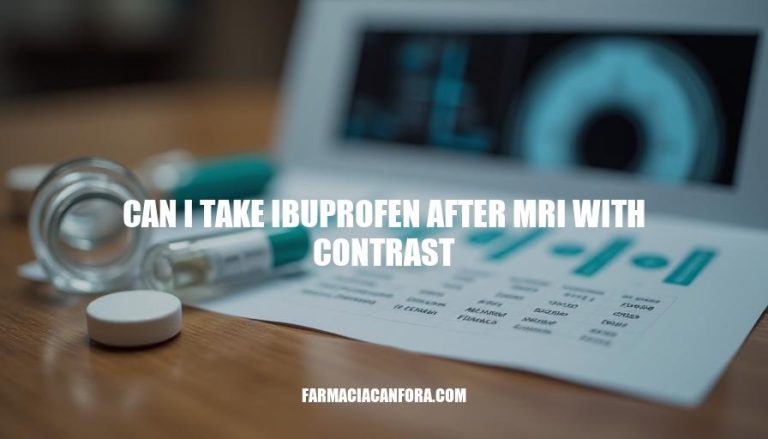


Understanding whether you can take ibuprofen after an MRI with contrast is crucial due to potential interactions between the contrast agents and medications. MRI contrast agents, often containing gadolinium, can sometimes cause side effects or interact with other substances in your body. Knowing the safe use of medications like ibuprofen post-MRI helps prevent adverse reactions and ensures optimal recovery. Always consult your healthcare provider for personalized advice.
An MRI with contrast involves injecting a contrast agent, usually gadolinium-based, into a vein before or during the MRI scan. This agent enhances the visibility of blood vessels, organs, and specific tissues by making them appear brighter on the images. This helps radiologists get a clearer and more detailed view, which is crucial for diagnosing conditions like tumors, inflammation, and blood vessel abnormalities.
Ibuprofen is a nonsteroidal anti-inflammatory drug (NSAID) used to reduce fever and treat pain or inflammation from conditions like headaches, toothaches, back pain, arthritis, menstrual cramps, and minor injuries.
After an MRI with contrast, someone might consider taking ibuprofen to alleviate any discomfort or inflammation caused by the injection of the contrast material. This can help manage mild pain or swelling at the injection site.
If you have any specific concerns or conditions, it’s always best to consult with a healthcare professional before taking any medication.
Taking ibuprofen after an MRI with contrast involves several considerations:
Kidney Function: Both ibuprofen and contrast agents can affect kidney function. Ibuprofen, a non-steroidal anti-inflammatory drug (NSAID), can reduce blood flow to the kidneys, potentially increasing the risk of kidney damage when combined with contrast agents, especially in individuals with pre-existing kidney issues.
Gastrointestinal Risks: Ibuprofen can cause gastrointestinal bleeding and ulcers. If the contrast agent causes nausea or vomiting, the risk of gastrointestinal complications may increase.
Allergic Reactions: While rare, both ibuprofen and MRI contrast agents can cause allergic reactions. Combining them might increase the risk of a severe allergic response.
Cardiovascular Concerns: Ibuprofen may increase the risk of heart attack or stroke, particularly in people with existing heart conditions. This risk is not directly related to the contrast agent but is an important consideration for overall health.
Drug Interactions: There are no specific interactions between ibuprofen and MRI contrast agents, but it’s essential to consider other medications you might be taking that could interact with either substance.
It’s always best to consult with your healthcare provider before taking ibuprofen after an MRI with contrast to ensure it’s safe for your specific health situation.
Medical guidelines generally advise caution when using ibuprofen after an MRI with contrast. The American College of Radiology (ACR) emphasizes monitoring for any adverse reactions to contrast media, but does not specifically contraindicate ibuprofen. However, the Mayo Clinic advises against using ibuprofen if there’s a risk of bleeding, which can be a concern with certain contrast reactions. Always consult your healthcare provider for personalized advice.
Taking ibuprofen after an MRI with contrast requires careful consideration due to potential interactions between the contrast agents and medications. While there are no specific contraindications, several factors must be taken into account, including kidney function, gastrointestinal risks, allergic reactions, cardiovascular concerns, and drug interactions.
It is essential to consult a healthcare provider before taking ibuprofen after an MRI with contrast to ensure it is safe for your specific health situation. Medical guidelines generally advise caution when using ibuprofen in this context, and personalized advice from a healthcare professional is always the best course of action.